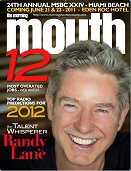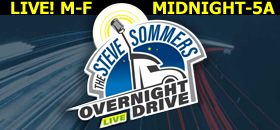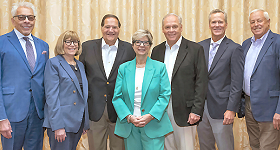Advertisement
|
Straight From the Mouth
The Morning Mouth's November interview with Randy Lane
(Reprinted by permission; Copyright © 2011 Talentmasters Inc.)
 |
I was about to ask which shows you've worked with, but it may be better to ask who HAVEN'T you worked with: Ryan Seacrest, Kidd Kraddick, The Bert Show, Elvis Duran, Cadillac Jack, Paul Castronovo, Dave Ryan, The Mikey Show and I guess I should throw in Jimmy Kimmel.
Some of the people you didn't include are Fitz, Lex & Terry, Bob Rivers, Billy Bush, Don Bleu, Jamie White & Danny Bonaduce, Mark & Brian, Ace & TJ, Roula & Ryan, Jack Diamond, JB & Sandy, Mancow and Bob Dumas. I have wanted to (but never had the opportunity) work with Scott Shannon, Gene & Julie and Carson Daly, just to name a few. There are certainly many others.
As a former programmer, turned GM, turned consultant, turned talent specialist, at what point did you realize coaching talent was your forte?
Robert Murphy inspired me to become a student of the morning show process. When I was PD at Q101 in Chicago in the ë80's I hired Robert (Murphy in the Morning) who was a total pro and he was much better than I was when I hosted a morning show. I also became motivated to coach talent in an encouraging way after a couple of program directors coached me by only telling me everything I was doing wrong.
You've also discovered quite a few stars along the way. Give us a few?
I put Mark and Brian together and also worked with Jimmy Kimmel, Bert and Bob Dumas early in their careers and certainly recognized their star potential. Angela Perelli hired Ryan Seacrest with Lisa Foxx to do afternoon drive in Los Angeles.
What is it about a show or talent that usually gets your attention first?
Advertisement
|
A lot more shows are headed into syndication. How are you able to keep their local appeal on a national platform?
As long as it's a great show and relevant, engaging, topical, listener-focused as opposed to being too inside and it's going to do well locally. Of course you can do things like incorporate local breaks during the network cutaways and visit every market and stay visible in your own market. Social media is another forum to connect with listeners in every market.
Let's look at this from the opposite direction. What do you tell a local show in medium to large market that suddenly finds themselves up against a well-known syndicated show, complete with their megastar host and co-host along with a cadre cast members?
Maintain relevance and topicality with a focus on being local - be out in the market; find local characters; talk about relevant local issues that a syndicated show won't; emphasize "live and local" in your branding.
Among talent, PPM remains its hottest topic. A few years back, a lot of programmers were quick to say cut the chatter, tighten interviews, add more music, etc. You were among the few that didn't necessarily buy into that. What could they have done differently?
Many people overreacted by changing shows, even high performing ones, before seeing how they would perform with the new methodology. While it is true that all shows benefit from cutting out meaningless chit-chat and getting to the point since we live in an on-demand, short-attention-span world, it gets down to the quality of the content.
There are several shows on music stations, both male- and female- targeted, that play very little or no music and pull outstanding PPM ratings. We work with shows that play no music, shows that play 10 songs, and
Advertisement
|
Very few shows are ever excused from occasional rating's wobbles. Some even experience more than one downward trend. What's the best/worst way to deal with rating ups and downs?
The bottom line is to make sure that the show is doing the work and operating on all cylinders. If that is happening, then don't get overly excited about victories and don't get too down about the losses, because there are so many factors. When one meter can impact an entire demo you can't get too crazy one way or another.
A question I get asked a lot is how does a show that plays a lot of music manage to get their non-music elements to stand out?
Exceptional teasing, highlighting your best moments and your characters through imaging, creating sticky content that people will talk about and using the web and social media to get more bang for your buck.
When it comes to working with shows is there such a thing as one size fits all? Do you have a standard list of tips and techniques you begin with and work from there?
No and yes. No, one size doesn't fit all and we believe in building shows based on their characters and their strengths. And yes, there are fundamental principles that apply to all shows in all formats.
In 23 years of doing Boot Camp I still get asked this question by a lot of young up and coming jocks: what does it take to make it in a major market? I'm sure you get asked the same. What do you think are the most common elements that separate superstars from not so superstars?
There are superstars in all size markets. The common elements are what we said earlier - fresh perspective, real, likable, engaging. Bobby Bones is a superstar in Austin, TX and That Guy Kramer was a superstar in Panama City (just moved to Tampa). What does it take to make it in a major market? Balls of steel. There's a lot more at stake, a lot more pressure and a lot more people in your business.
Radio wasn't excused from the recession. Shows are now having to work with much smaller budgets (if any), in some cases with smaller staffs, etc. How do recommend they compensate?
1. Accept that this is the new reality. 2. Apply the 10,000 hour rule -- do the work. 3. Create phenomenal content that is going to get people's attention without marketing. Get creative.
The unsung heroes for a lot of shows are its producers. What are some common qualities of some of the best producers you've worked with?
A great producer is a game-changer. The best producers think about the show 24/7 and find content everywhere they go, like texting ideas from the supermarket checkout line. They are prep monsters who bring great ideas to the show daily; provide a buffer between talent and management; keep the hosts organized; have good production and networking skills, social media savvy and a strong work ethic. And, they won't take no for an answer.
I've heard it said, creating a great radio show is a like a putting together a reality show, i.e., Role Play, staying true to character, building suspense, etc. with TSL so critical in a PPM environment, what are some of the top ways to keep people tuned in not only until after the break, but to listen for longer blocks of time?
More importantly than listening longer, it's about getting listeners to come back for more tune-ins. Dave Ryan at KDWB/Minneapolis is exemplary in creating tune-ins through enticing teasing, storylines and serial content that pays off over several days, getting people to come back.
Technology and social media has changed most shows approach to winning. Facebook, Twitter, podcasting, mobile apps, I could go on. Stephanie Winans of your company was brought into your company specifically for this purpose. How much of your coaching includes attention to these new platforms?
Today everyone has an opportunity with social media to strengthen their personality brand. Stephanie provides our clients with recommendations on improving their online brand. We also provide tips in our weekly Content Ideas on podcasting, website content, Facebook and Twitter.
While on the subject, among the complaints I get often deal with websites. Too clunky, too busy, hard to navigate. Does Stephanie offer any quick tips for cleaning up these sites and making them more effiecient?
We are proud of the fact that the service we provide clients now includes both their on-air and online brand. Stephanie begins her evaluation of clients' websites with two key points: content and framework.
Content: Station and show websites are an extension of the on-air brand, and listeners expect to see what they hear on-air on the site. News stories, hot topics, articles discussed, video clips played, and regular segments should all be present on your website.
Framework: Killer content isn't valuable if it can't be found. Simple site navigation is best to ensure listeners can find what they're looking for easily. Make a list of each segment of your show and each feature on your website. Without looking at your site, ask yourself "where would I expect to find this?" for each item. Use your answers to simplify your sitemap.
I keep hearing over and over there aren't any great new talent on the horizon, but in the last few years shows like Fitz, Kane, Bobby Bones and others have all arrived on the scene and exploded. Any other shows we should keep our eyes on?
Cadillac Jack and Dallas at Kicks 101.5 in Atlanta, is one of the few country morning shows that outperform the station. That Guy Kramer dominated in Panama City and just recently moved up to Play 98.7/Tampa. We also work with five morning shows in Canada that are outperforming their stations and we want to keep them secret.
Past and present: Best show, top to bottom, you've ever heard? Why?
Too many (for different reasons) to mention.
Final question: Alabama or LSU? Final score?
'Bama! 13 to 10. Roll Tide!
Most fascinating personality you ever met?
Kidd Kraddick and Jamie White. Kidd Kraddick is a creative genius and mad scientist. Jamie White's honesty and fearlessness were an inspiration for the Sex and the City writers. She was ahead of her time.
I have to ask about the hair. Mousse, gel or natural?
This is the biggest secret I will reveal today. It's called Punk-out Molding Gunk by Rockaholic!
Advertisement
|












